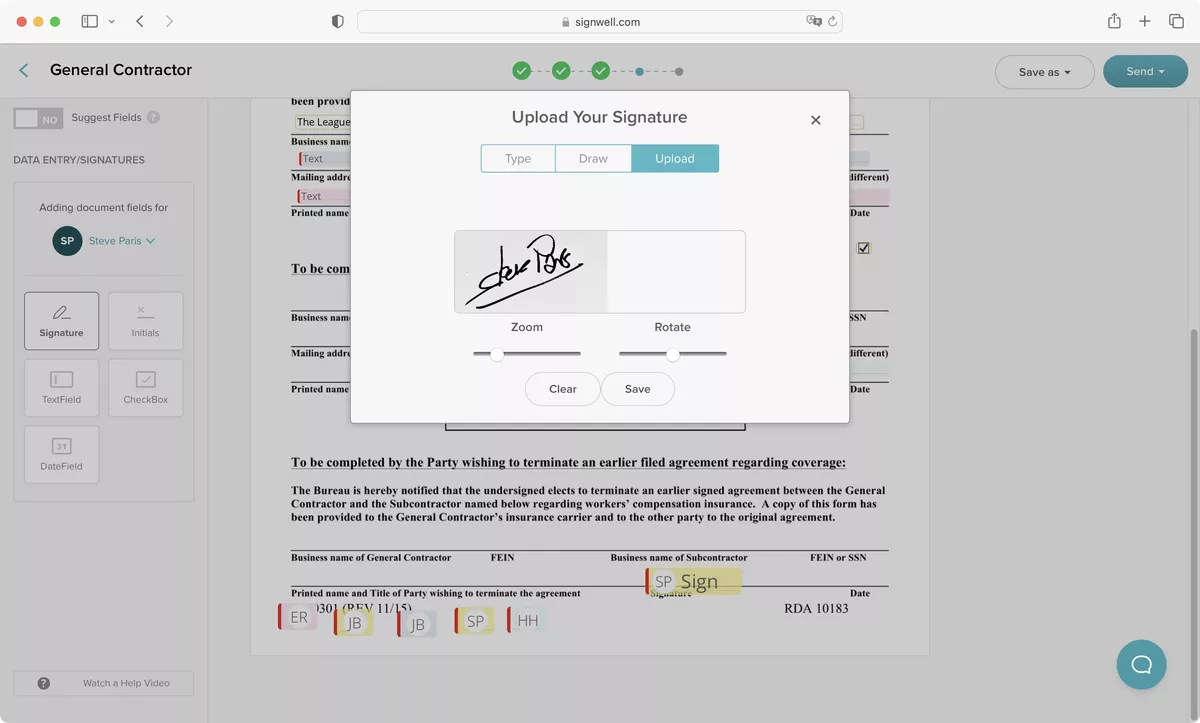Helpful Summary
- The overview: This guide highlights the significance of electronic signatures in streamlining workflows for UK businesses, covering their legal validity, types, and best practices for implementation.
- Why trust us: SignWell has supported over 61,000 businesses worldwide in enhancing efficiency and maintaining security standards through our secure and compliant electronic signature solution.
- Why it matters: Electronic signatures save time, reduce costs, and enhance security. They help businesses follow legal requirements, support environmental sustainability, and streamline operations.
- Action points: Select a compliant electronic signature solution, such as SignWell, to implement electronic signatures. Ensure adherence to legal and regulatory standards, provide staff training, secure necessary signatures, and maintain detailed records.
- Further research: Keep up with legislative changes impacting electronic signatures in the UK and gain expert insights on the future of e-signatures by following SignWell’s blog.
Looking to Implement Electronic Signatures in Your UK Business?
Efficiency is crucial, especially in a fast-paced business environment. One tool transforming business operations is the electronic signature. Gone are the days of waiting for physical signatures, mailing documents back and forth, or dealing with clunky fax machines. Electronic signatures simplify and expedite business transactions, making them essential for modern businesses.
Electronic signatures have been legally binding in the UK since 2000 when the Electronic Communications Act was passed. They save time, reduce costs, and are kinder to the environment. But how can your business implement them safely and effectively?
In this guide, we’ll explore the legal framework surrounding electronic signatures in the UK, different types of electronic signatures, best practices for their use, whether the UK recognizes SignWell as a valid provider, and what the future holds for electronic signatures.
Why Listen to Us?
At SignWell, we bring extensive experience in electronic signatures. We’ve assisted over 61,000 businesses in implementing secure workflows, ensuring the validity of each signature.

Our expertise addresses common challenges like fraud prevention and compliance, helping businesses operate securely and efficiently. With our solutions, clients enjoy reduced paperwork, faster approval cycles, and enhanced security, ensuring their transactions are both legally binding and protected.
The Legality of Electronic Signatures in the UK
Understanding the legal landscape is crucial when integrating electronic signatures into your business processes. Fortunately, the UK has clear regulations governing their use.
Electronic Communications Act 2000
The Electronic Communications Act 2000 was among the first UK legislations to address electronic signatures. It established that electronic signatures are legally valid for authenticating documents, provided they meet specific criteria.
Under this Act, an electronic signature is defined as data in electronic form attached to or logically associated with other electronic data, used by the signatory to sign.
UK eIDAS
Following Brexit, the EU’s eIDAS regulation was converted into UK law with some modifications, known as “UK eIDAS.” The two frameworks are nearly identical (for now), but different regulatory bodies govern them.
UK GDPR
While not specifically an e-signature law, the UK’s GDPR legislation does impact electronic signatures in the sense that it dictates what information you can collect and how you need to store, process, and protect it.
Types of Electronic Signatures in the UK
Under UK eIDAS, there are three kinds of e-signatures. All are legally binding, but each offers varying levels of security and comes with a different set of requirements.
Simple Electronic Signatures (SES)
Simple Electronic Signatures (SES) are the most basic form of legally binding e-signature. In the UK, a SES can be as simple as typing your name at the bottom of an email or clicking the “I Agree” button on a website.
Advanced Electronic Signatures (AES)
Advanced Electronic Signatures (AES) offer greater security. They are uniquely linked to and capable of identifying the signatory, use signature creation data only the signatory controls, and can detect any data alterations.
Qualified Electronic Signatures (QES)
Qualified Electronic Signatures are the safest, most secure option. They fulfill all AES criteria and require a certificate from a qualified trust service provider (QTSP). QES are legally equivalent to handwritten signatures throughout the UK.
Benefits of Using Electronic Signatures in the UK
Legal Validity and Compliance
Electronic signatures are legally recognized in the UK under the Electronic Communications Act 2000 and the eIDAS Regulation, ensuring they hold the same legal weight as handwritten signatures. They also help businesses follow legal and regulatory requirements, including data protection (GDPR) and industry-specific standards, making transactions both secure and legally binding.
Efficiency and Productivity
Electronic signatures speed up document execution by allowing parties to sign agreements instantly from anywhere in the world, eliminating delays from mailing or in-person signing. They also automate and streamline workflows, resulting in faster approval cycles, reduced paperwork, and improved operational efficiency.
Environmental Benefits
By reducing paper usage, electronic signatures support environmental sustainability. They help organizations lower their carbon footprint and contribute to green initiatives, aligning with the UK government’s goal of achieving net zero emissions by 2050. Reducing paper waste is a critical step, as paper currently constitutes 26% of landfill waste.
Best Practices for Using Electronic Signatures in the UK
Choose the Right Technology
Choose an electronic signature solution that offers robust security features, a user-friendly interface, and compliance with UK legal standards. Platforms like SignWell meet these criteria, providing a reliable solution for businesses. We use advanced encryption methods to protect data in transit and at rest, ensuring document security and compliance.
Ensure Compliance
Verify that your electronic signatures meet legal requirements under the Electronic Communications Act 2000 and eIDAS Regulation. Regularly review and update your processes to stay compliant with any changes in legislation. At SignWell, we ensure compliance by providing clear documentation and detailed audit trails for every signed document, making it easy for you to demonstrate adherence to legal standards.
Train Your Staff
Provide training for your team on using electronic signatures, focusing on platform functionality, security practices, and legal implications. This ensures that all staff members can use electronic signatures effectively and responsibly.
Secure Your Signatures
Prioritize security by using encryption and authentication measures to protect electronic signatures. Restrict access to sensitive documents and signature tools to authorized personnel only. At SignWell, we ensure your signatures are secure with industry-leading protections, including AES-256 encryption for stored data and Transport Layer Security (TLS) for data in transit.
Maintain Records
Keep detailed records of all electronically signed documents. This includes the date and time of the signature, the signatory’s identity, and any other pertinent information. These records can be invaluable in litigation.
At SignWell, we provide detailed audit reports that track time stamps to ensure that the date and time of the signature are recorded accurately. This feature is essential for legal and regulatory purposes.
Does the UK Recognize SignWell as a Valid E-Signature Provider?
Yes, SignWell is recognized as a valid e-signature provider in the UK. We follow the regulations of the Electronic Communications Act 2000 and the UK eIDAS Regulation, ensuring our signatures are legally binding.

Additionally, SignWell adheres to the UK’s General Data Protection Regulation (UK GDPR), which is essential for handling the personal data of UK residents. We implement robust measures to protect data and uphold data protection rights.
Our platform is user-friendly, secure, and tailored to meet the needs of businesses of all sizes. We offer features such as secure storage and retrieval of documents to follow UK document retention requirements. With SignWell, you can trust that your electronic signatures are valid and secure.
Conclusion
Electronic signatures are revolutionizing business operations by boosting efficiency and enhancing security. To effectively implement this technology, it’s essential to understand the legal framework, types of electronic signatures, and best practices for use.
SignWell is a trusted e-signature provider in the UK, offering a reliable and compliant solution. Our user-friendly platform, combined with robust security features, makes us an excellent choice for businesses of all sizes.
Ready to streamline your business processes with electronic signatures? Try SignWell for free today and experience the benefits for yourself.
Sign with a team that knows what you need.
Putting a signature on a document shouldn’t be hard. The SignWell mission? Simplify how documents get signed for millions of people and businesses.
Get Started Todaybusinesses served, so far...
total documents signed
customer support satisfaction